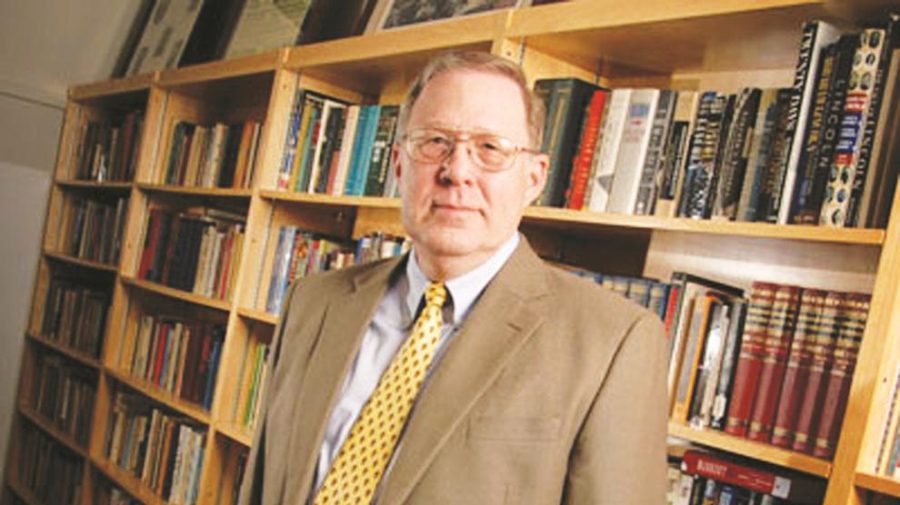 Students and faculty gathered in Alston Hall Monday night to hear Lawrence Kohl, who won this year’s Last Lecture, give his speech.
Students and faculty gathered in Alston Hall Monday night to hear Lawrence Kohl, who won this year’s Last Lecture, give his speech.
Ally Nevarez, a graduate student and member of the Student Selection Committee, said students nominated about 100 professors this year based on the question: “If this were your last time to address a group of UA students, what would you say?”
Nevarez said the committee interviewed instructors and students in order to make a final decision on the recipient.
“What makes Last Lecture unique is it is completely chosen by students,” she said.
Kohl, an assistant professor of history, titled his lecture “Education in the Age of Science: A Critique.”
Kohl said that, rather than reminiscing on his career, he planned to tell the audience about important themes that shaped his career.
Kohl said scientific thinking dominates every other way of thinking. Many modern-day scientists know people will like what they discover or create because people now rely on technology, he said.
“Our age has become disillusioned and dissatisfied with what humans can do,” Kohl said.
According to Kohl, the 21st century is a time of competition — countries compete, humans compete and even schools compete. Kohl said DARPA, Defense Advanced Research Projects Agency, is working to create people who are greater than humans to fight in the military.
Humans use drugs to increase athletic performance beyond their natural ability, Kohl said. Colleges compete for students, which should make the education system better but doesn’t. Kohl warned that what students learn in the classroom can have major effects on the world.
“What we do here today will resonate for decades to come,” Kohl said.
Kohl discussed how educators now have a misguided worship of technology, where they prefer the new over the old and compare the real to the virtual. Also, instructors should trust students to be able to learn without all new technology in the classroom.
“I wish America’s educational leadership had a little more humility,” he said.
The scientific mind is reshaping education to make it more reductive, Kohl said. One example is the goals and objectives instructors have to put on the class syllabus. According to Kohl, it is wasteful, corrupting and destructive of proper teaching. Some instructors may even create goals which are easily achieved. He also added that students are shortchanged because they only gain knowledge the instructor can test.
“You can teach for today and appear successful or you can teach for tomorrow and actually achieve it,” Kohl said.
He mentioned that the clickers many UA students use are a great example of the reductive scientific mindset. Every technique will not necessarily work for every class or for every set of students.
Kohl said he disagrees with educators who claim that young people are better at multitasking than older generations. He said multitasking could lead to injuries and deaths, such as those caused when people use their cell phones while driving.
He said most people think new is always better than old, and this can be destructive because people may accept educational techniques without looking at their usefulness, necessity and implications. Kohl said some people think the past is obsolete and can no longer teach anything.
“We seem desperate to leave the past behind us,” Kohl said. “The past is a soil out of which we grew.”
Humanities and fine arts, especially, cannot replace an instructor with technology because technology can cause the course to lose its value to students, he said.
Kohl gave an example of students who may be looking forward to taking a class taught by Rick Bragg, only to discover he is teaching the course through pre-recorded videos. Kohl said students would likely be disappointed, and a lecture can be a life-changing experience.
“Much of my career has been shaped by those who have long passed away,” Kohl said. “We need to create an educational environment of, by and for human beings.”
Kohl pointed out instructors should live up to the University’s slogan, “Touching lives.”
“Let them be human lives, and let them be touched by human minds,” Kohl said.
Nevarez said Kohl’s lecture was similar to what the committee anticipated because Kohl influenced students’ thoughts more than what they would learn in class.
“It was exactly what we expect from a Last Lecture,” Nevarez said.









